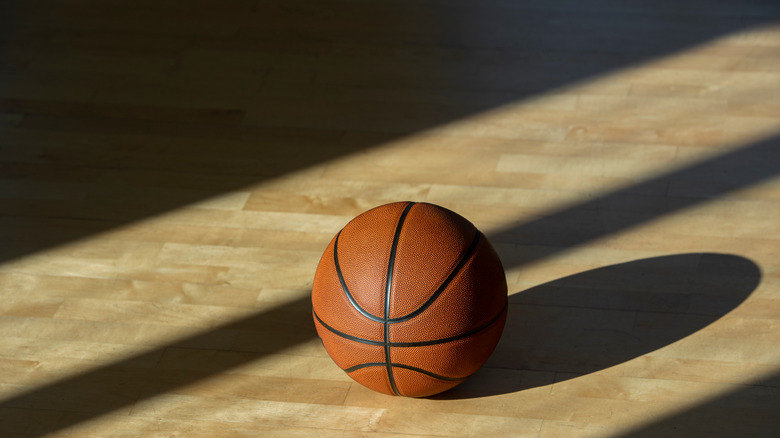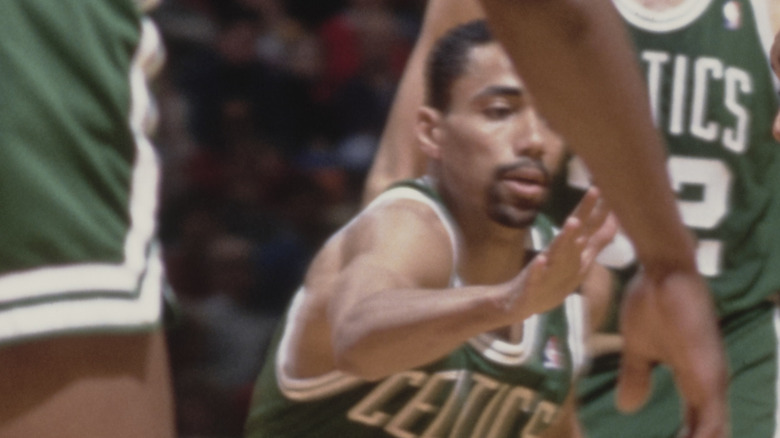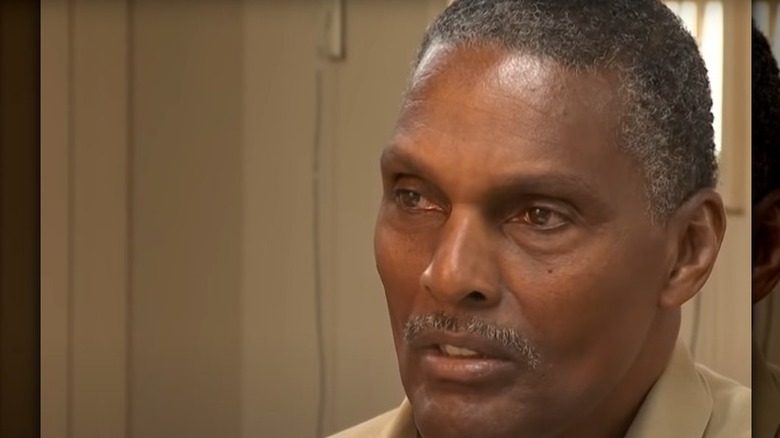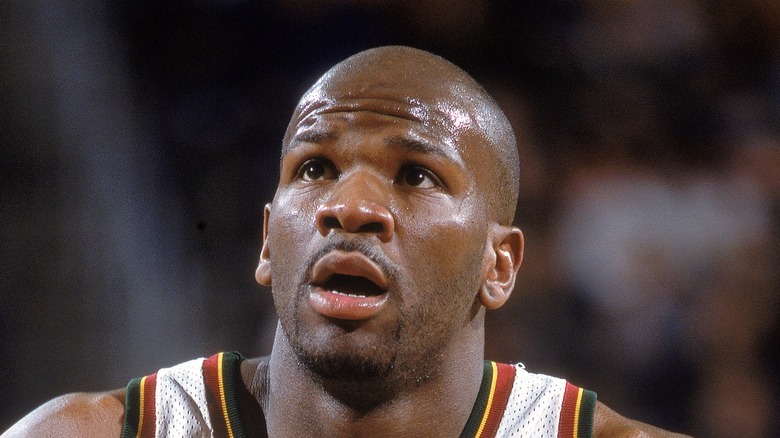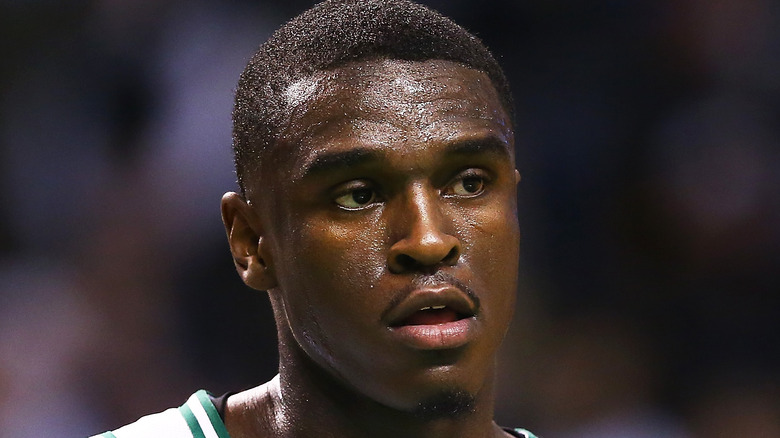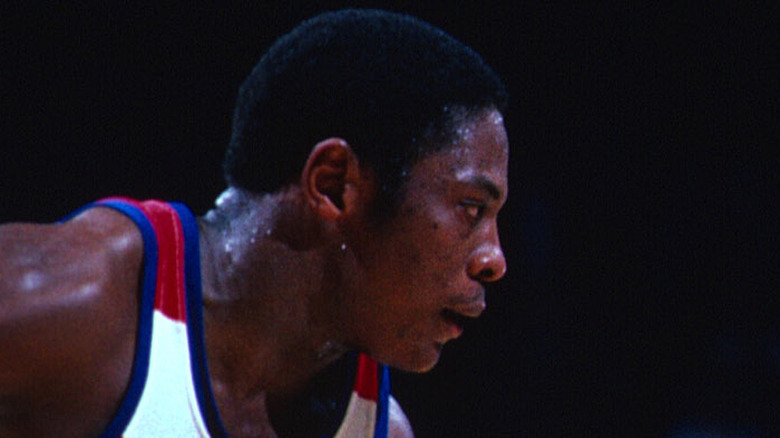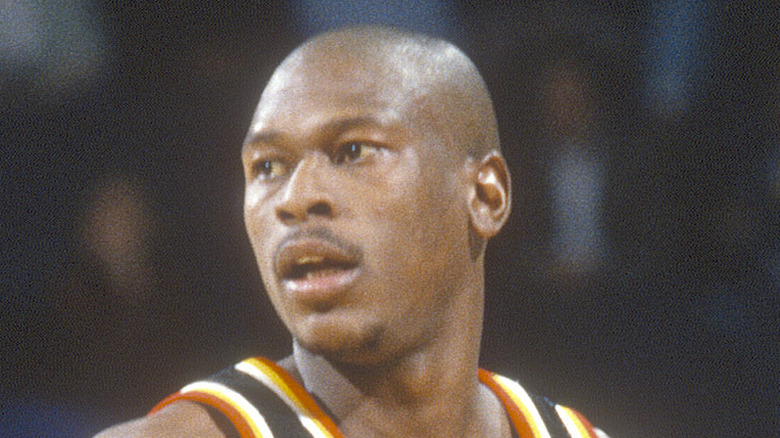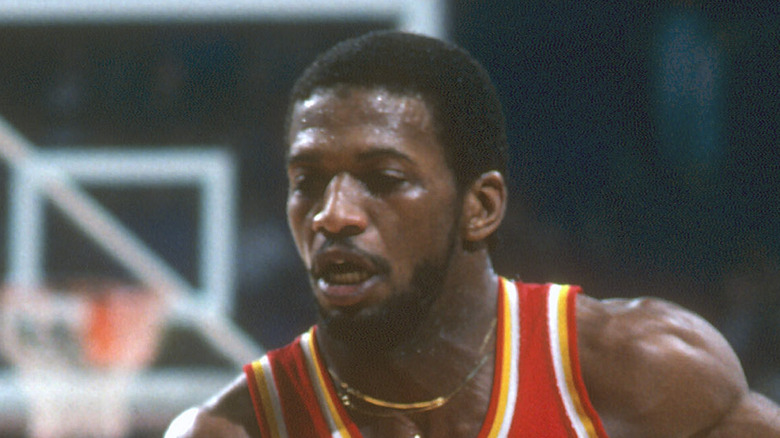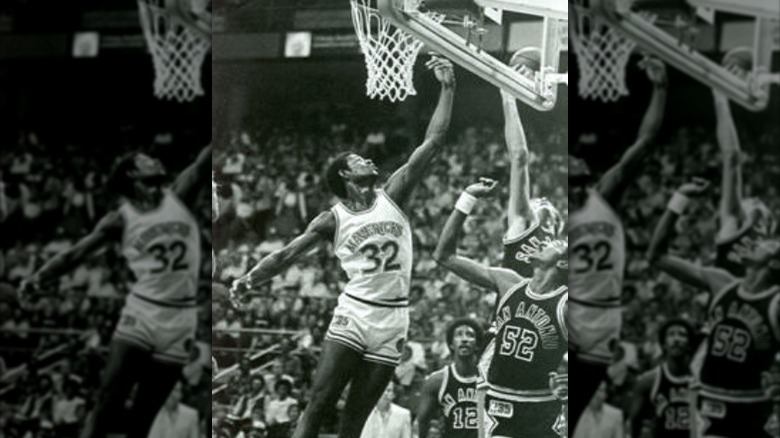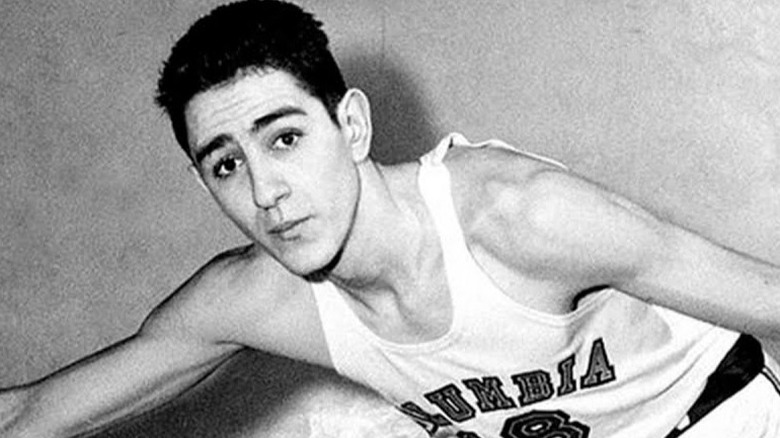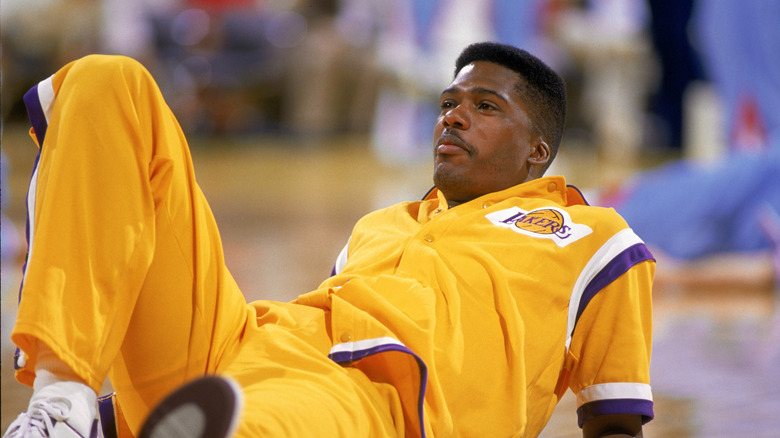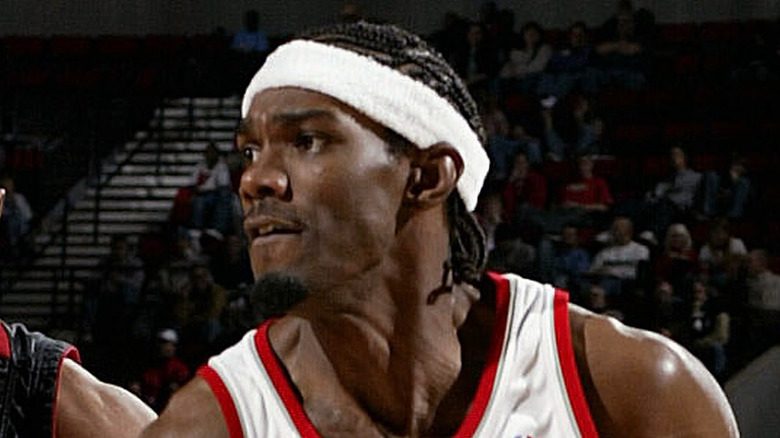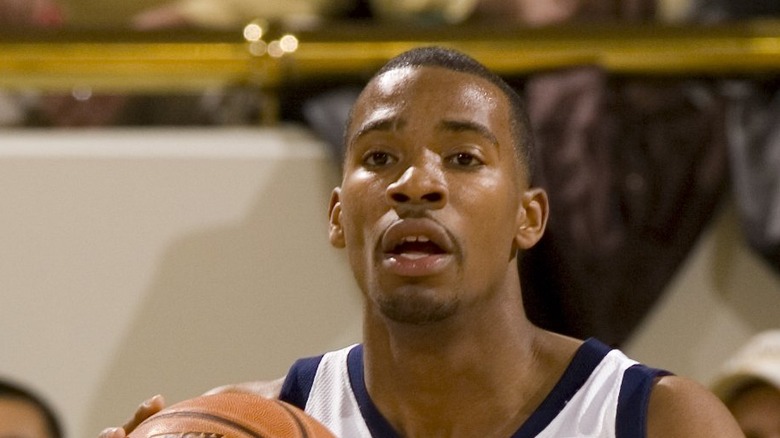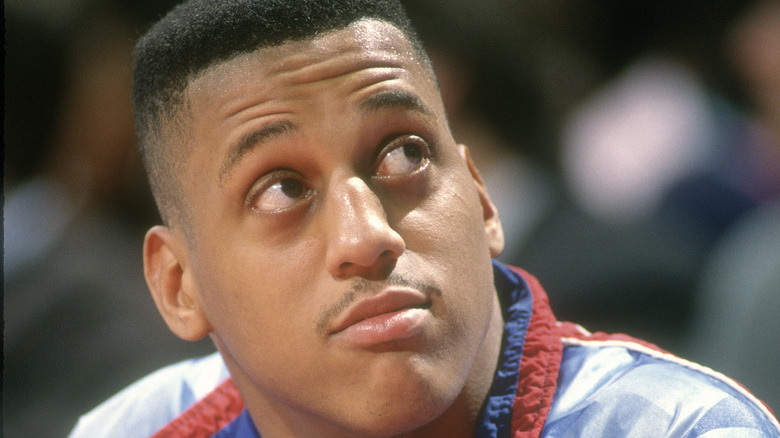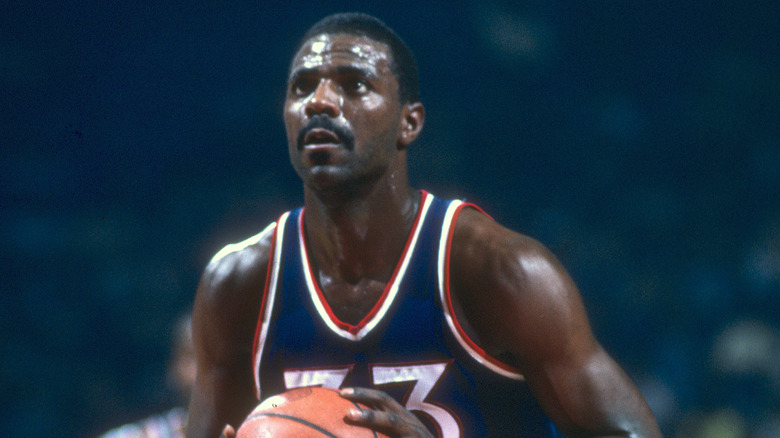Worst Crimes Committed By NBA Players
Even if you've somehow never watched a single game of major league basketball, the fame of the greatest NBA players has likely infiltrated your life in some way. Legendary NBA players have given their names to expensive, bouncy shoes, been name-dropped in chart-topping songs, and starred in highbrow films (looking at you "Space Jam," both the Michael Jordan and Lebron James versions). They've even made national news getting into Twitter beefs with the president of the United States.
But the glory and wealth that can accompany entry into this illustrious league has unfortunately been clouded by some seriously heinous criminal acts off the court. Spanning a seven decade long period of NBA history, these are some of the worst crimes committed by NBA players, who lost their fortunes, their reputation, and often their freedom for their reprehensible actions.
This article contains references to sexual assault, domestic violence, child abuse, and substance abuse.
Charles E. Smith
As The Baltimore Sun describes, Charles E. Smith won bronze in the 1988 Olympics, helped lead Georgetown University to the top eight in the 1989 NCAA tournament, and was both a consensus All American and Big East Player of the Year in 1989. Smith made his NBA debut with the Boston Celtics in 1989, per the Chicago Tribune, playing two seasons before his career came to an abrupt halt.
On March 22, 1991, Smith went to a club with his college roommate, AP reported, where the Chicago Tribune reported he'd drank a couple of beers over two hours. He was also supposedly taking codeine for a toothache. Then he got behind the wheel. At around 1:30 a.m., Smith plowed his van into two female students, throwing them to the curb and killing them both. Continuing his errors of judgment, Smith drove a few more blocks before making a U-turn and returning to the scene, only to drive by as witnesses gathered.
As the AP notes, it was a taxicab driver who spotted Smith's vehicle and followed him, leading police to his location via radio, where Smith was arrested about a mile away. While being cleared of manslaughter and driving under the influence of alcohol (his BAC was 0.06 while the state's limit was 0.10), a year later Smith was convicted of vehicular homicide and sentenced to four and a half years in prison, serving two and a half years before being paroled.
Tom Payne
After an impressive few years at the University of Kentucky, where he was the school's first Black basketball player, Tom Payne was a number two pick for the Atlanta Hawks in the 1971 NBA Supplemental Hardship Draft, as per Sportscasting. But just a year later, according to court records, Payne followed a woman home and attempted to assault her. She escaped and gave the police his license plate number. When cops released Payne's picture, another victim picked him out as the assailant who sexually assaulted her one month earlier. Payne was tried and found guilty of rape in 1972 and sentenced to two years in prison, the Gadsden Times reported.
He spent five years in jail in Georgia and was then extradited to Kentucky to face another charge of rape, was found guilty, and spent another five years of a life sentence in prison until being paroled in 1983, as reported by WDRB. After a brief stint as a professional boxer (via Sportscasting), in 1986, Payne was again found guilty of assault, this time in California, where he was imprisoned until being paroled in 2000. His freedom was brief, since he had violated his parole in Kentucky, where he returned with his life sentence waiting. Payne would finally be paroled in 2019, almost 40 years after his first conviction.
If you or anyone you know has been a victim of sexual assault, help is available. Visit the Rape, Abuse & Incest National Network website or contact RAINN's National Helpline at 1-800-656-HOPE (4673).
Ruben Patterson
A self-proclaimed "Kobe Stopper," Portland Trail Blazers player Ruben Patterson once had the formidable task of guarding the Black Mamba.
But as Sportscasting details, in 2001, he was convicted under a plea deal for the attempted rape of the family's nanny. Under the Alford plea, he was sentenced to one year of prison, but the judge suspended all but 15 days. He also had to pay $5,000 in fines, $400,000 in a civil settlement, and he was suspended for multiple games. Even though he agreed to the deal, Patterson maintained his innocence. "I did not commit a criminal act," he said (via Sportscasting). "I did engage in an act of consensual sex and I cheated on my wife. I would like to apologize to everyone I have hurt for my stupid decision, including my wife, family, team, fans, for my terrible mistake. I cheated, and I have learned a very painful lesson."
Even though –- at best –- he cheated on her, Patterson's wife believed he wasn't a criminal. "I'm here today because I do not believe Ruben raped or attempted to rape our former nanny," she told the court (via ESPN). "I love my husband and I believe he's done the right thing for our family to put this matter behind us."
Jabari Bird
A former shooting guard for the Boston Celtics during the 2017-18 season, before being traded to the Atlanta Hawks in 2019 and waived by them the very next day, Jabari Bird admitted in a tearful hearing in 2021 that he had assaulted and repeatedly choked his girlfriend. After the attack, which took place in Bird's apartment, the victim was able to escape and seek help after Bird passed out, about four hours later, as reported by WCBV.
In court, ESPN reported the victim said that "the physical and psychological pain you have caused me will haunt me forever." The damage done was obviously intense. "I miss the woman I was before I met Jabari," she said (via WCBV). At least Bird seemed contrite, crying as he told the court, "She didn't deserve this and I'm sorry." Bird was put under home confinement for 60 days and a further two years of probation.
If you or someone you know is dealing with domestic abuse, you can call the National Domestic Violence Hotline at 1−800−799−7233. You can also find more information, resources, and support at their website.
Billy Ray Bates
"It's hard for me to look back on my career now, 'cause it's so painful," former Portland Trail Blazers player Billy Ray Bates said (via WBUR). "I had it all in the palm of my hand, and I let it slip away."
Nicknamed the "Black Superman," Bates struggled with alcoholism through his career and retirement, as per Sportscasting. It all went very wrong for him after downing a half-pint of vodka on January 17, 1998. "I wasn't under the influence of drugs. I was under the influence of alcohol," he said (via WBUR). "I had two jobs. I had a car. We'd just moved to a new condominium. It was on a Sunday. I said, 'I'm going to play the lottery.'" That trip ended when Bates attempted to rob a Texaco station at knifepoint for money to buy cocaine, details the Oregonian. He was arrested later that day, found passed out, face down on a lawn. He was convicted of first- and second-degree assault, serving almost five years in a New Jersey prison.
But Ruben got things together after he got out, as he told the Oregonian. "Everybody ... saying he won't be anything but a drug addict or alcoholic. But they are wrong. People can change. And I have."
If you or anyone you know is struggling with addiction issues, help is available. Visit theSubstance Abuse and Mental Health Services Administration website or contact SAMHSA's National Helpline at 1-800-662-HELP (4357).
'Mookie' Blaylock
A former Atlanta Hawk and NBA All-Star player, in May 2013, "Mookie" Blaylock had not only had his driving license suspended for a DUI but was also under doctor's orders to not drive at all, because of the seizures he had suffered due to alcohol withdrawal. Nonetheless, he took to the road again, experienced a blackout, and killed a woman in a crash on the outskirts of Atlanta, as reported by ESPN.
According to Sports Illustrated, Blaylock had specifically been told not to drive, even having previously signed a doctor's admonition directing him not to get behind the4 wheel. He was convicted and sentenced in 2014 to 15 years, with three to serve.
If you or anyone you know is struggling with addiction issues, help is available. Visit theSubstance Abuse and Mental Health Services Administration website or contact SAMHSA's National Helpline at 1-800-662-HELP (4357).
Eddie Johnson
"I partied a little extensively, but I wasn't abusing it," Eddie Johnson said in 1981 (via the New York Times). "The whole idea of me abusing drugs is outlandish." However, his drug abuse would lead to the downfall of his NBA career and the downward spiral of his life.
By 2006, Johnson of Atlanta Hawks fame had racked up at least 100 arrests, by his own reckoning, when he walked uninvited into an apartment in Ocala, Florida, and assaulted an 8-year-old girl.
The victim described to detectives that Johnson had told her "not to tell anyone about what just happened," according to ESPN. Perhaps unsurprisingly, Johnson denied the charges, saying he only kissed the child "as a friendly gesture," and that "I love them kids like my own. I'm no pervert." He was convicted and sentenced to life in prison for the assault as well as for an assault on a 25-year-old woman just a couple days prior to his attack on the underage girl. He died in state prison, in Milton, Florida, in 2020.
If you or someone you know may be the victim of child abuse, please contact the Childhelp National Child Abuse Hotline at 1-800-4-A-Child (1-800-422-4453) or contact theirlive chat services.
Darrell Allums
In 1987, former UCLA star Darrell Allums went on a robbery spree to fund his cocaine addiction. As reported in the Los Angeles Times, his fall from grace began after an injury tore his right knee ligaments, ending a globe-trotting career that started with UCLA, followed by a 22 game stretch with the Dallas Mavericks, before moving to the Philippines and then finally Switzerland. Returning to the United States after exhausting his funds, Allums first turned to robbing Target stores, before landing himself in hot water by trying to rip off an undercover policeman for two $20 rocks of cocaine. While on probation for this charge, Allums tried a new hustle — robbing pizza delivery drivers, again and again.
Specifically targeting Domino's pizza deliverers, he was finally caught after trying to lure the same Dominoes employee he'd robbed a few nights prior, who was able to identify him and call the police, who traced him from the car he was waiting in.
"I am not a robber. I am innocent of these crimes," Allums told the jury, while acting as his own attorney, according to UPI. Accused of no less than 14 robberies, he was eventually convicted of eight and sentenced to nine years in state prison.
Jack Molinas
The scale of Jack Molinas' game-fixing in the late 1950s and 1960s was so widespread that ESPN dubbed it "The Molinas Period." Molinas' biographer Charley Rosen described him (via Ozy) as a "lawyer, and master of the stock market ... a big-time gambler ... a jailbird, a pornographer, a loan shark, and quite probably a murderer." The New York Times called him simply "the Mephistopheles of college sports."
After being dropped by the Fort Wayne Pistons and then banned altogether by the NBA for gambling on — and against — his own team, Molinas was swept up in a mass arrest of 37 players in 1961 for bribing players to fix games over a four-year period. He was sentenced to 10 to 15 years, of which he served five. Molinas didn't have any remorse, saying, "My so-called crimes hadn't hurt anybody except some bettors and some bookies" (via the New York Times).
His life of crime continued and eventually caught up with him in 1975, when he was killed by a bullet to the head outside of his home.
Jay Vincent
Once a star forward with the Michigan State Spartans who played alongside Magic Johnson, Jay Vincent enjoyed a nine-year-long stretch in the NBA with a career average of 15 points a game, as per ESPN. But in 2010 Vincent pled guilty to mail fraud and tax evasion and was sentenced to five-and-a-half years in prison, as reported by CBS Detroit. The crimes centered around an internet scam where over 10,000 people were together charged over $2 million with the empty promise of being registered as certified home inspectors, though none were actually hired.
"Mr. Vincent wants to right the ship," his lawyer said, according to ESPN. "He had a legitimate business. There were things that happened that just weren't appropriate and became the norm. Things got out of hand."
ESPN reports that Johnson wrote to the judge asking for leniency for his former college teammate: "I know what he did was wrong and I hope in time he will be able to repay all the people who lost money in this situation. I believe he got involved with the wrong people and made some really bad decisions."
Vincent was released in 2016 after serving nearly five years of his sentence, as per CBS.
Qyntel Woods
In 2004, the discovery of an abandoned pit bull with suspected fight wounds led to the home of Portland Trail Blazers player Qyntel Woods, according to the Washington Post. His house was searched by police, leading to the discovery of a half-dozen more pit bulls, as well as a possible "dogfight room" (via ABC News).
Woods eventually pled guilty to animal abuse. "I've tried to be a responsible pet owner all of my life," he said in a statement (via ABC News). "Because of that I am very sorry and saddened that my dog, Hollywood, was injured. I also deeply regret the concern this has caused other pet owners and citizens in our community ... Once again, I offer my sincere apology."
Woods was sentenced to 12 months' probation and 80 hours of community service. The Portland Trail Blazers also dropped him for breaching his contract.
Javaris Crittenton
Claiming to have attempted to shoot a man who robbed him, former Lakers and Wizards player Javaris Crittenton pled guilty in 2015 for the drive-by shooting in 2011 of a 22-year-old mother of four, as reported by ESPN. Already infamous for a dramatic locker room argument between himself and Wizards teammate Gilbert Arenas, as described in a Sports Illustrated report, where both players waved a loaded handgun at each other, Crittenton was also a member of a West Los Angeles gang, the Mansfield Gangster Crips. According to prosecutors, the intended victim was a rival gang member, but an innocent bystander was tragically shot instead. He was sentenced to 23 years in prison.
"It's just an unfortunate circumstance. He ruined his career but, more importantly, he ruined the life of Julian Jones and her family," the deputy district attorney lamented, according to ESPN.
Tate George
In 2016 Tate George, of the New Jersey Nets and Milwaukee Bucks fame, received a sentence of nine years in prison for his role in a Ponzi scheme that cost his victims over $2 million. Posing as the CEO of a successful investment firm, "The George Group," he claimed that they had assets of over $500 million and would generate revenue from real estate investments. In actuality, according to the New Jersey U.S. Attorney's Office (via People), George "used the money from new investors to pay existing investors in Ponzi scheme fashion," and that he lined his own pockets as well, using "the money for home improvement projects, meals at restaurants, clothing and gas. In reality, The George Group had virtually no income generating operations."
George still maintained he wasn't trying to commit fraud. "For the umpteenth time, I'm sorry — I'm sorry the projects got delayed," he said, per ESPN. But the prosecutor said George's ability to get away with his illegal activities for so long was the "monstrous result of our culture's elevation and celebration of professional athletics." Nor did he think this would be the end, telling the judge he believed George would likely commit more crimes.
Sylvester 'Sly' Williams
A first-round pick of the New York Knicks in 1979, who also starred in the Boston Celtics in the 1980s, Sylvester "Sly" Williams was sentenced to five years in prison, reports CBC, in 2002 for the kidnap of a woman the prior year. Originally facing sexual assault charges in addition to kidnapping, as reported by ESPN , Williams eventually plead guilty to the kidnapping, an attack that lasted the best part of 24 hours, with Williams tying up the victim and threatening the captive woman with a knife.
"He pleaded guilty to what he said he had done," Williams' lawyer said, per the AP. "He has consistently denied the other charges."
If you or someone you know is dealing with domestic abuse, you can call the National Domestic Violence Hotline at 1−800−799−7233. You can also find more information, resources, and support attheir website.
